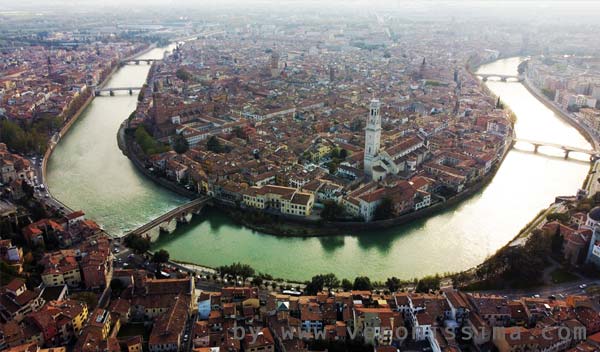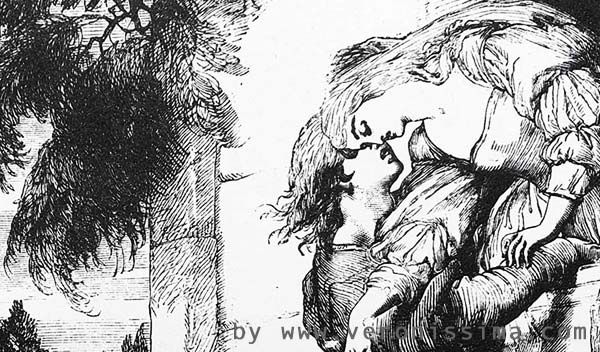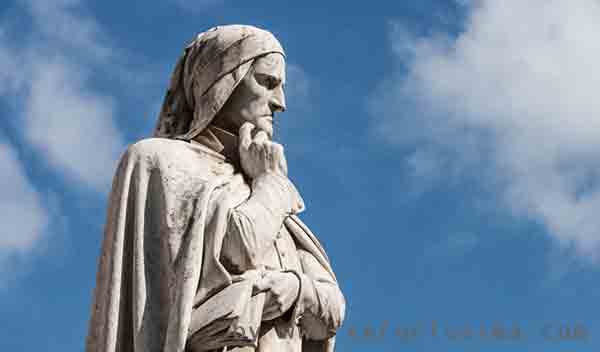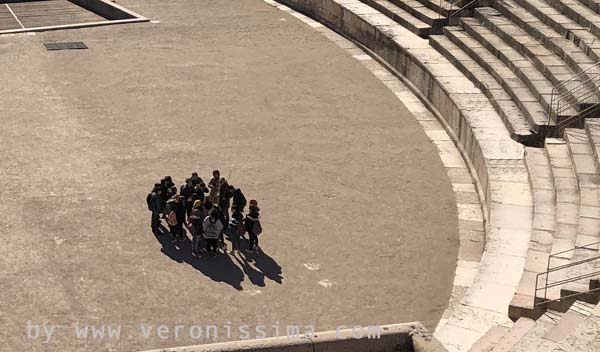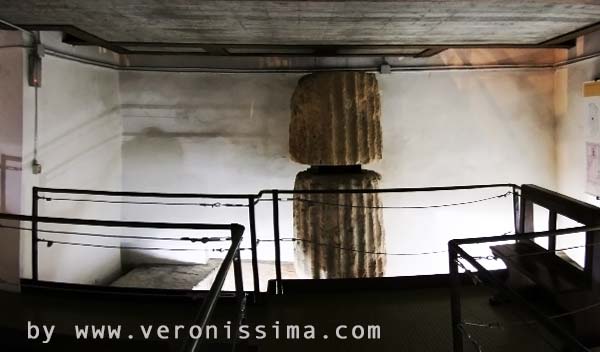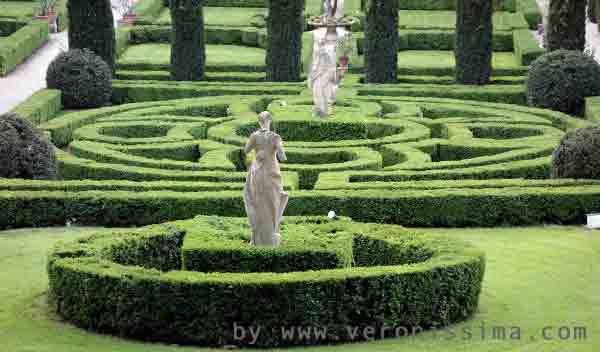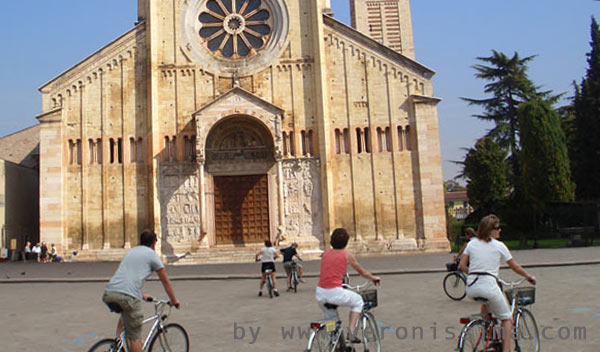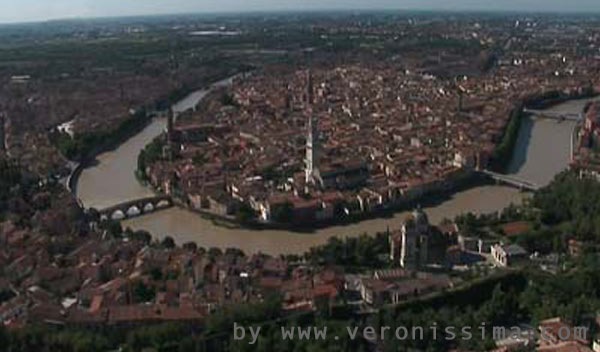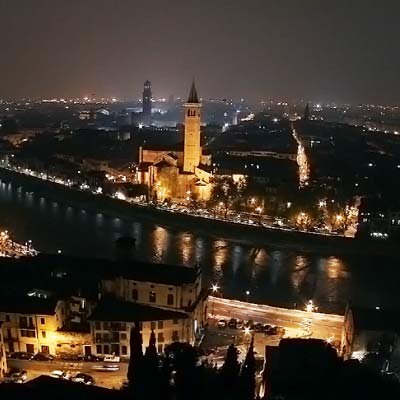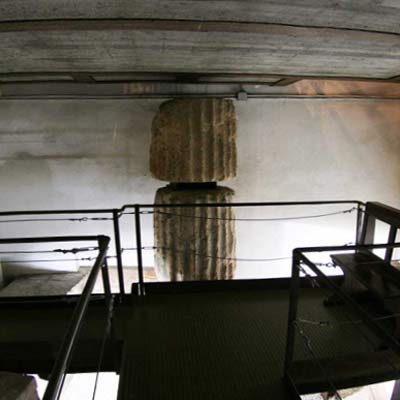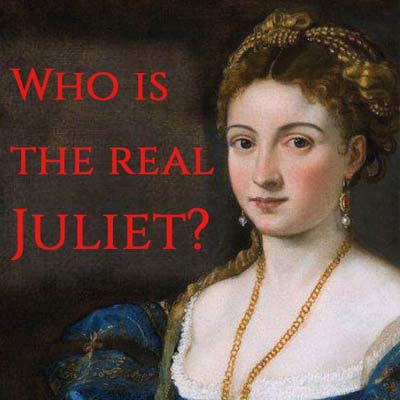Dante in Verona
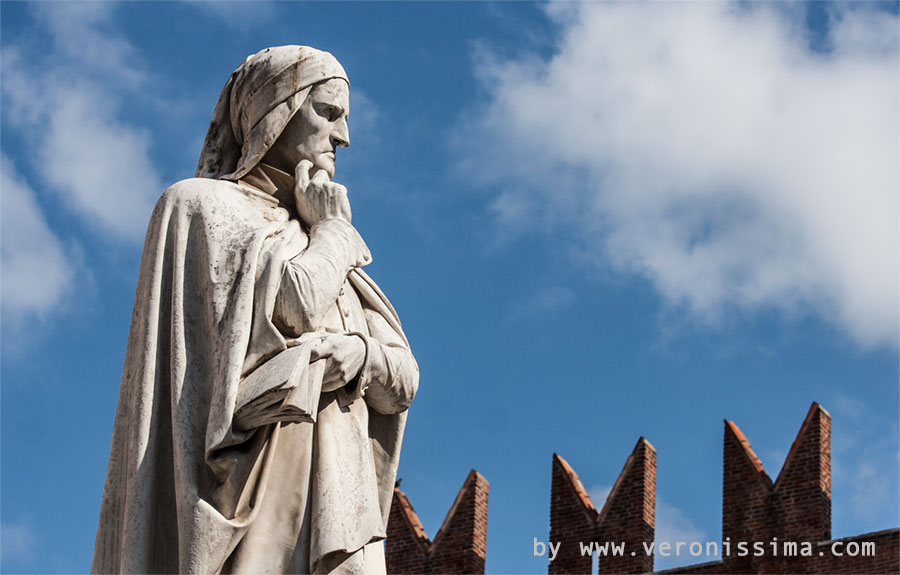
With the guided tour of Dante's Verona offered by our tour guides, it is possible to visit Dante's places in Verona as they appear in his biography and writings.
Oncoming Tours
Bookings and info:
+39 333 2199 645 info@veronissima.com P.I. 03616420232 C.F. CPPMHL74L13L781C
In about two hours you can discover the places and monuments related to Dante's presence in Verona, his sources of inspiration and references to the city in the Divine Comedy. This tour is ideal for school groups and lovers of history, literature and of course Dante.
Your first refuge
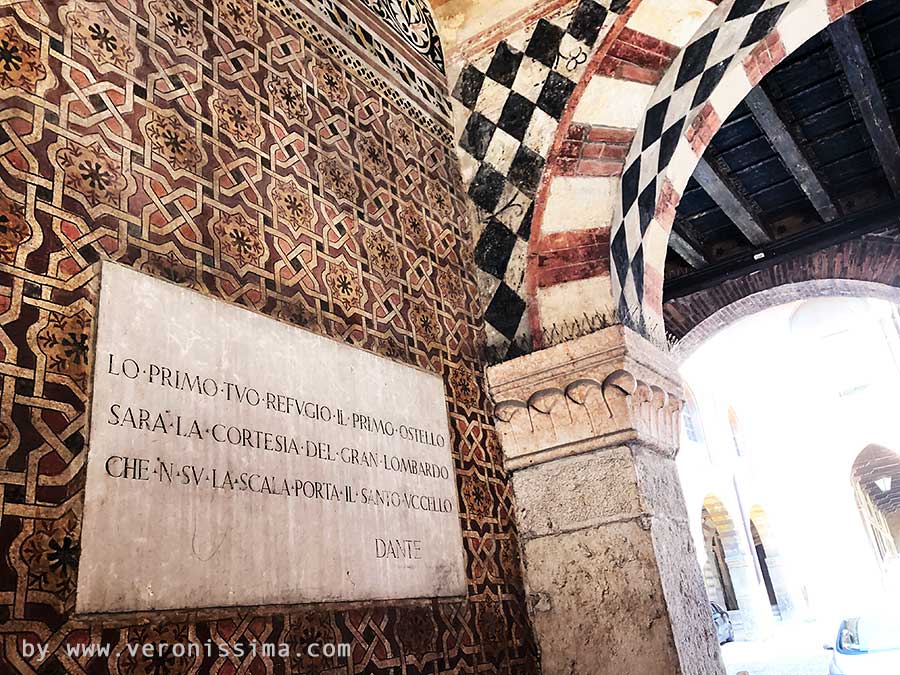
Marble inscription with a quote from the Divine Commedy inside Scala family palace, where Dante found hospitality.
Not much is said about Dante's stay in Verona. Yet it was his first destination after the exile from Florence. He stayed there at least seven years, writing part of the Divine Comedy in which there are many references to the city and its historical characters. Dante's descendants still live in Verona.
Your first refuge and your first inn shall be
the courtesy of the great Lombard, he
who on the ladder bears the sacred bird.
And so benign will be his care for you
that, with you two, in giving and in asking,
that shall be first which is, with others, last.
These are the words of Cacciaguida, Dante's ancestor, who prophesies the exile from Florence and the hospitality he will find in Verona. The poet meets him in Paradise, in the Heaven of Mars where he finds the spirits who fought for the faith. The "great Lombard" is Bartolomeo. The ladder is the coat of arms of the Scala family that can still be seen today on the monuments of the city, flanked by eagle wings symbol of the imperial vicariate of the Scala family.
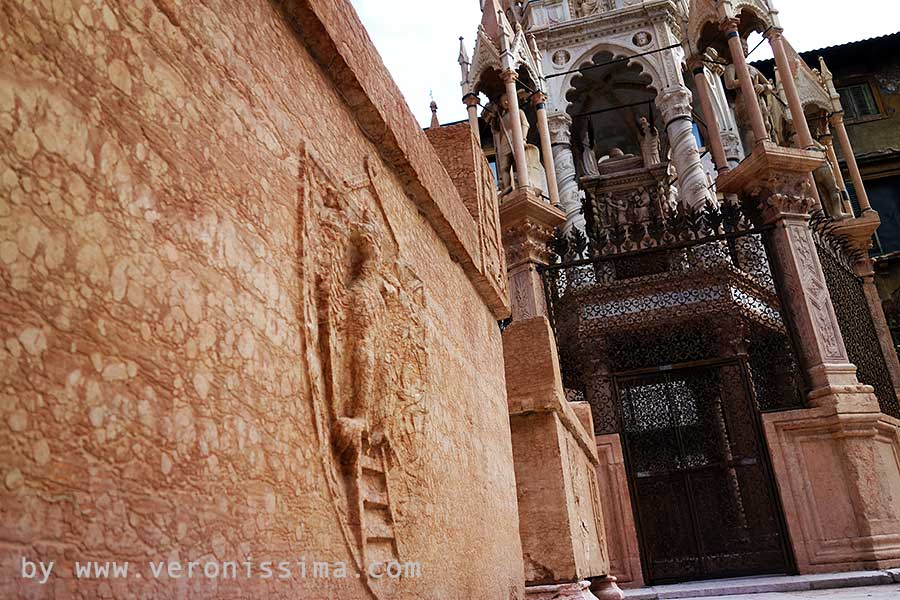
The description of the Scala family coat of arms in the Divine Comedy perfectly matches the features of Bartolomeo's sarcophagus inside the Arche Scaligere, Scala family's monumental cemetery.
The exiled Dante stayed in Verona, a liberal and Ghibelline city, at the beginning of '300 under Bartolomeo della Scala and again approximately between 1312 and 1318 during the rule of Cangrande.
If you want to know more
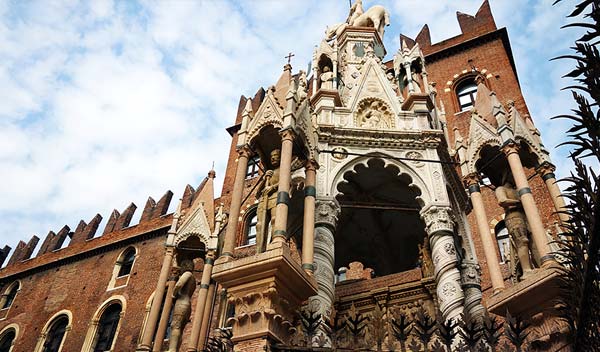
The Scala family monumental tombs
Find out more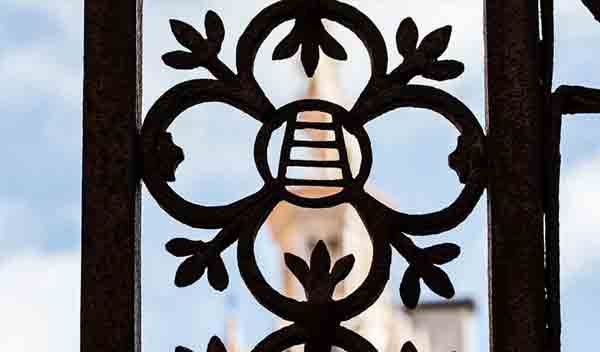
Verona at the age of Scala family
Find out moreDante and Romeo and Juliet
The various versions of Romeo and Juliet set the story in the few years in which Bartolomeo della Scala was lord of Verona and Dante stayed in the city.
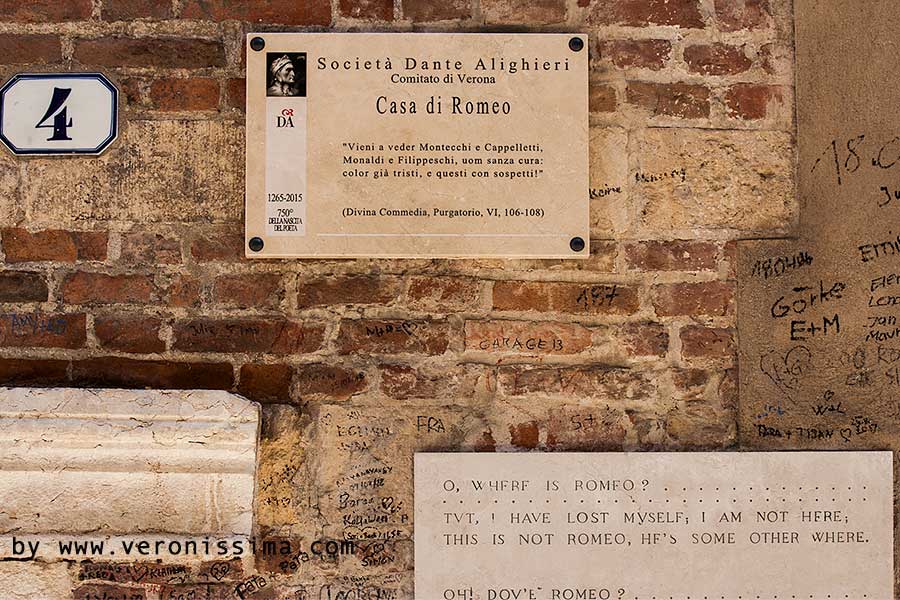
The tour in Dante's Verona stops at the Montecchi's house. On the facade of the so-called Romeo's house next to Shakespeare's verses you will find the quote of the enigmatic lines of the Divine Comedy in which Dante speaks of the Montecchi and Cappelletti (Montagues and Capulets).
Come—you who pay no heed—do come and see
Montecchi and Cappelletti, sad already,
and, filled with fear, Monaldi and Filippeschi.
Many believe that this sentence from the Divine Comedy is proof that Romeo and Juliet is not just a legend. Others, however, think that it inspired the story to Luigi da Porto, first authors to write the plot as we know it.
It speaks of the bloody clashes between Guelphs and Ghibellines in which Dante himself was involved. What could possibly be the cause of the sadness that Dante attributes to the rival Montecchi (Montagues) and Cappelletti (Capulets) families?
If you want to know more
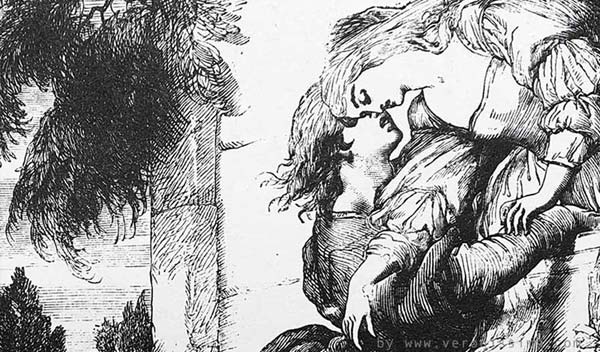
Romeo and Juliet in Verona.
Find out moreThe Palio Race of the Green Fabric
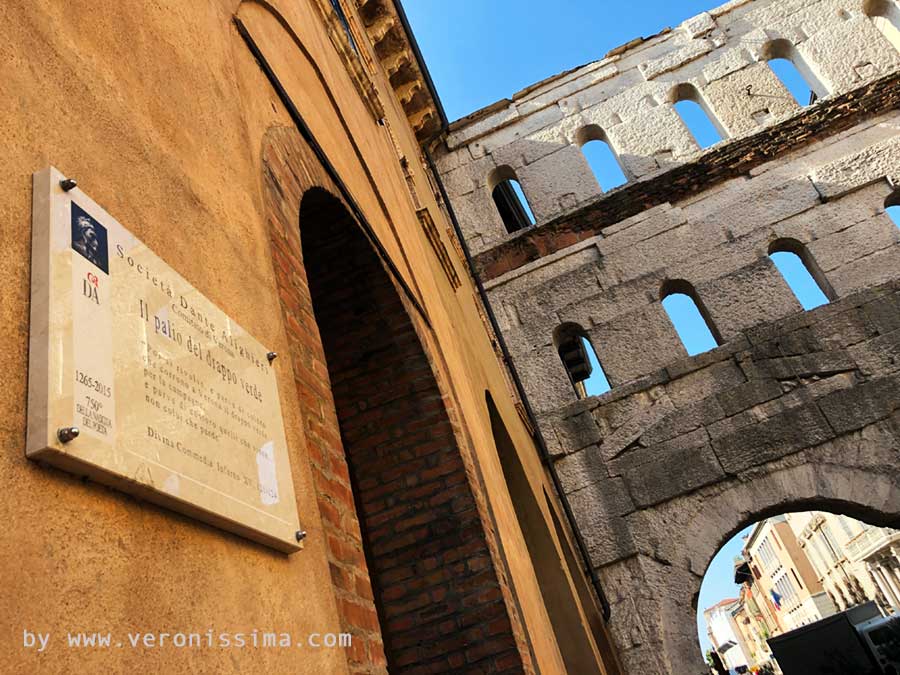
The tour of Dante's Verona stops at Porta Borsari, on the route of the ancient Palio of Verona.
In Verona Dante also saw the famous Palio (traditional race) that for centuries was run in the city of Verona. The poet must have been impressed by the multitude of men who ran at breakneck speed on the dirt road of the ancient Via Postumia, in order to win a precious green woolen fabric. Dante used this image to describe the torture of the circle in which he met Brunetto Latini.
And then he turned and seemed like one of those
who race across the fields to win the green
cloth at Verona; of those runners, he
appeared to be the winner, not the loser.
On a wall near Porta Borsari, the entrance to the Roman city on the route of the palio, an inscription recalls the famous verses.
Cangrande della Scala
Dante was again in Verona in 1312, during the rule of Cangrande. The lord of Verona, appeared to the poet as an ideal of military strength, nobility of spirit and political ability that would have allowed the pacification of Italy, which had become "untamed and wild". It is again Cacciaguida who speaks about it:
You shall—beside him—see one who, at birth,
had so received the seal of this strong star
that what he does will be remarkable.
People have yet to notice him because
he is a boy—for nine years and no more
have these spheres wheeled around him...
Put trust in him and in his benefits:
his gifts will bring much metamorphosis—
rich men and beggars will exchange their states.
The first time he had been in Verona as a guest of Bartolomeo della Scala, Dante had met Cangrande, who was only 9 years old at the time. People had not yet realized the potential of this child born under the sign of Mars, who would have accomplished great deeds and whose benevolence Dante would have enjoyed.
Dante worked in the service of Cangrande, drafting letters and texts, and performing diplomatic missions.
Verona in the Divine Comedy
During the six years he spent in Verona, Dante worked hard on the Commedia.
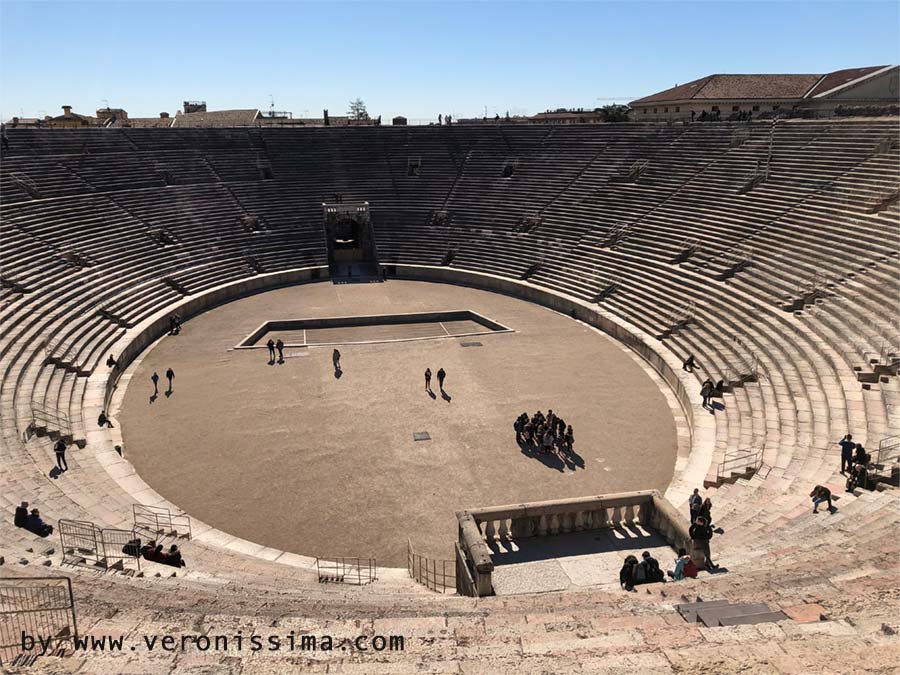
There is no certain evidence that it was a source of inspiration, however looking at the interior of the Arena it is impossible not to think about the concentric circles structure of Dante's Inferno. According to the most accredited chronology, Dante started writing his masterpiece after having been in Verona and therefore having certainly seen the Roman amphitheater.
St. Zeno Church
Another conjecture on the sources of inspiration concerns the bronze portal of San Zeno. Observing the numinous figures that emerge from the dark bronze of the bas-reliefs, one immediately thinks of the famous door of the Inferno. Dante knew the abbey of San Zeno well, so much so that in the Purgatory he meets one of its old abbots:
I was St. Zeno’s abbot in Verona
under the rule of valiant Barbarossa,
of whom Milan still speaks with so much sorrow.
And there is one with one foot in the grave,
who soon will weep over that monastery,
lamenting that he once had power there,
because, in place of its true shepherd, he
put one who was unsound of body and,
still more, of mind, and born in sin—his son.
The accidious soul complains about the current abbot, illegitimate son of Alberto della Scala, who imposed him at the head of the rich abbey.
We know that for the complex theological setting of Paradise Dante often consulted with the wise Augustinian friars of the monastery of St. Euphemia.
Capitolare Library
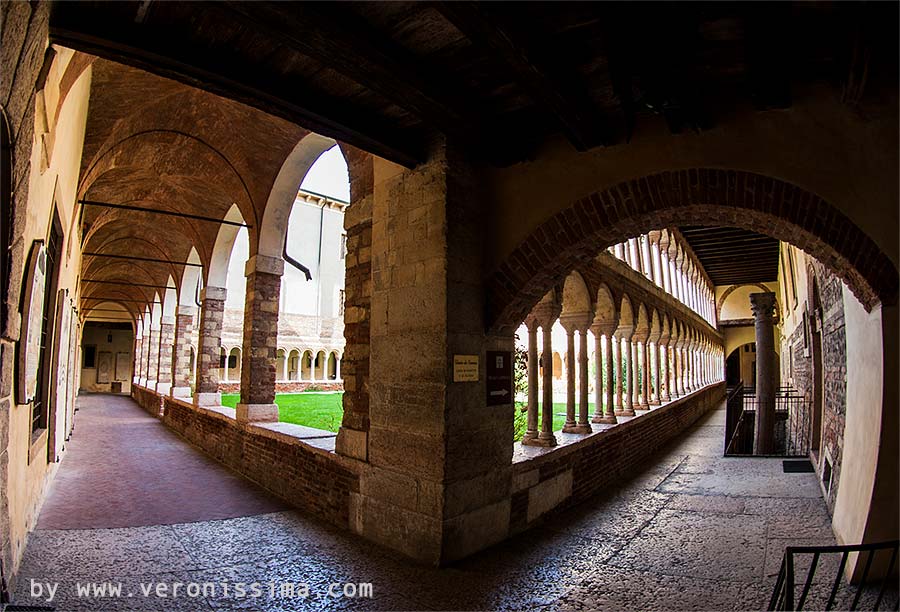
The cloister of the Biblioteca Capitolare, one of the most evocative places in Verona, perhaps frequented by Dante, certainly by Petrarch who among the ancient manuscripts discovered the letters of Cicero.
It remains uncertain if and how much he frequented the Capitolare Library. However, to expound the "Quaestio de aqua et terra" (see below) Dante chose Sant'Elena, the church of the Canonici attached to the Capitolare. Pietro Alighieri, Dante's son, became the official notary of the Capitolare, which managed the library. These are clues that make it more than likely that for his research Dante frequented this temple of knowledge very well known at the time.
The Departure
In 1318 Dante left Verona for Ravenna. Much has been written about the reasons for Dante's departure from Verona, searching for causes inside and outside the city, in ambassadorships proposed to Dante by Ravenna, in a changed relationship with the lord of Verona or even friction with the Scala family court.
The Quaestio de Aqua et Terra
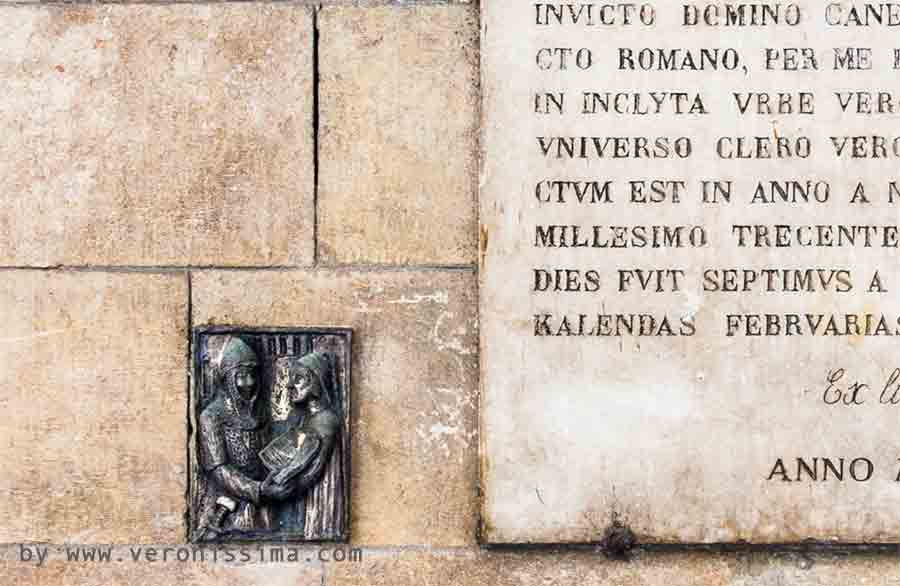
On the facade of the church of Sant'Elena a Latin inscription recalls the presence of Dante who in 1320 here expounded the "Quaestio de Aqua et Terra". The church can be visited together with the whole Duomo complex.
In 1320 Dante is again in Verona where in a cold and snowy evening, January 7th, in the church of St. Elena, read to the Canonici and men of culture of Verona his famous Quaestio de aqua et terra, a real essay on physics. Perhaps he hoped to conquer in this way the admission to the teaching in the Studio (the high school of Verona that was becoming a famous university). However, the teacher of logic, Artemisio, was preferred and Dante continued his wanderings until his death the following year, perhaps due to malaria in Ravenna.
Dante's Ancestry
Dante's legacy in Verona goes beyond the places and the people he met. In 1315 the family joined him in Verona when also his sons Pietro and Jacopo, reached the age of majority, had to leave Florence. The son Pietro studied law in Bologna financed by Cangrande della Scala and settled with his family in Verona, at Bevilacqua palace, still existing just in front of Santa Anastasia church. In 1355 he bought an estate in Valpolicella where, still today, Serego Alighieri counts, direct descendants of Dante, produce Amarone and other wines of the territory. Inside the church of San Fermo there is the Alighieri family chapel.
If you want to know more
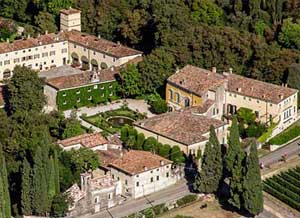
Serego Alighieri winery in Valpolicella.
Find out moreOn Dante's Footsteps
Following in the footsteps of Dante in Verona in the places where the great poet lived, along the streets he walked, in the company of a tour guide, allows you to discover monuments, places and views of Verona in unusual tourist routes and full of charm.
Further information and bookings:
+39 333 2199 645 info@veronissima.com P.I. 03616420232 C.F. CPPMHL74L13L781C

 IT
IT 日本
日本 DE
DE FR
FR 中文
中文 ES
ES